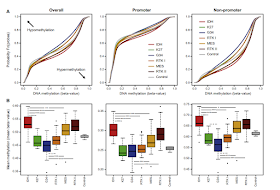Hi Stephen,
Could I check if my interpretation of the G34r mutation of GBM is correct.
Does this mutation mean that only a small part of the tumour is methylated?
Stephen W added the following image from the study Hotspot Mutations in H3F3A
and IDH1 Define Distinct Epigenetic and Biological Subgroups of Glioblastoma

Hi Joanne,
ReplyDeleteSee the image above. The H3F3A G34 mutant methylation subtype you're asking about is colored in blue. As you can see, the G34 subtype has the lowest levels of overall DNA methylation, as well as low levels specifically in promoter and non-promoter regions of the genome. This refers to global methylation status, not just in the MGMT gene. So overall methylation levels throughout the genome are low compared to other methylation subtypes. Notably IDH1 mutant types (red) have the highest level of methylation throughout the genome.
Probably of more interest to patients, doctors and caregivers is methylation levels of DNA specifically at the MGMT promoter region, where hypermethylation "silences" the MGMT gene (preventing its transcription), making the tumor cells more vulnerable to alkylating chemotherapies like temozolomide and CCNU.
Thank you for your reply Stephen. As I find understanding this a little tricky can I just ask a question about the last paragraph as I'm a little confused.
ReplyDeleteIf hypermethylation silences the MGMT gene preventing its transcription, does that mean that the tumour is less likely to respond to TMZ? Only you then mention that this makes the tumour cells more vulnerable to TMZ which I interpreted as meaning the TMZ would be more effective?
Sorry if I sound dim.
regards
Joanne
The MGMT enzyme (which results from the transcription and translation of the MGMT gene) is a DNA repair enzyme that undoes the damage done by TMZ. So when the gene is silenced by hypermethylation, the cells are more vulnerable to TMZ, because there is much less of the MGMT enzyme to repair the damage.
DeleteMethylation of MGMT promoter = silencing of MGMT = less DNA damage repair following TMZ = better response to TMZ
Unmethylation of MGMT promoter = MGMT gene transcription is active and the MGMT enzyme is actively produced = more DNA damage repair following TMZ = less response to TMZ treatment
Your questions are perfectly reasonable questions to ask for anyone who's not a cell biologist by the way.
DeleteStephen,
DeleteThank you for simplifying it for me.